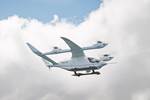Beta begins Alia CTOL production aircraft flight testing
Flight of first production aircraft fresh off Beta’s full-scale manufacturing line in Vermont is followed by Special Airworthiness certification from the FAA.
In November, Beta Technologies (South Burlington, Vt., U.S.) announced completion of its first Alia conventional takeoff and landing (CTOL) aircraft flight, which was also the first electric aircraft built on Beta’s new, full-scale production line. These developments continue to advance the company’s production efforts and path toward customer deliveries.
The Alia CTOL aircraft was manufactured at Beta’s 200,000-square-foot production facility in South Burlington. Following the completion of final assembly, the Federal Aviation Administration (FAA) inspected the aircraft for safety and compliance, granting the company a Multipurpose Special Airworthiness Certificate for experimental R&D, market survey and crew training for the CTOL, signifying the agency’s sign-off for flight.
On Nov. 13, Beta’s CEO, founder and test pilot, Kyle Clark, conducted the production aircraft’s first flight, which lasted nearly an hour and included a takeoff, climb to 7,000 feet, handling qualities evaluation, stability and control test points and initial airspeed expansion prior to flying several approaches and a normal landing.
“This start of our production CX300 flight test campaign is a result of years of hard work and focus on studying customer requirements, hard engineering, manufacturing, production, quality and test,” says Clark. “It represents a significant milestone for Beta, and is the beginning of a new phase for the business. With this, we’re one step closer to putting this technology into the hands of our customers.”
The aircraft’s build and subsequent flight comes approximately one year after Beta opened the doors to its production facility. In that time, the company has installed aerospace-grade tooling for aircraft assembly and ground support equipment, and stood up and started production of propulsion, batteries and other systems.
“We learned a lot from this first production build,” continues Clark. “We weren’t just building an aircraft company, we were building and refining a system to build high-quality aircraft efficiently. This first build allowed the team to collect data and insight on manufacturing labor, tooling design, processes, yields and sequences, all of which are being used to refine our production systems.”
Following this launch of its production test flight campaign, Beta will continue testing the aircraft for the standard 50 hours, at which point it is certificated to transition to Market Survey and/or Crew Training certificate, enabling the company to fly outside of Burlington and Plattsburgh and to continue training additional pilots on the aircraft. The company will also continue production of additional aircraft, including Alia CTOL and Alia VTOL configurations.
The news follows the close of Beta’s Series C last month, which added $318 million in equity financing to the company’s balance sheet. The funds are being directed toward the continued acceleration of certification and production activities such as these.
Related Content
-
Midnight production aircraft completes full transition flight
This is Archer’s second full-scale eVTOL aircraft to achieve this milestone, critical to being able to carry commercially viable passenger payloads.
-
Vertical Aerospace eVTOL prototype goes down during uncrewed test flight
The U.K. company has confirmed the Aug. 9 accident that resulted in significant aircraft damage and potential setbacks.
-
Composites end markets: Automotive (2024)
Recent trends in automotive composites include new materials and developments for battery electric vehicles, hydrogen fuel cell technologies, and recycled and bio-based materials.
















